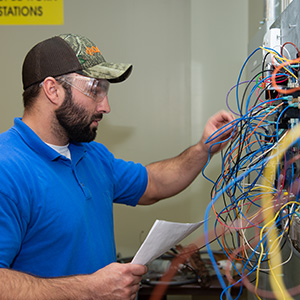RSI is a Great Training Option for Everyone
Learn more about how we can prepare you to advance your career.
If you’re not exactly sure what to do after high school, you’re not alone. It’s worth it to take some time and consider your options after graduation. Don’t be afraid to reach out for help, ask lots of questions, and take your time so you can make a decision you feel confident about.
Option 1: Start Working
If you’re not sure what to do after high school graduation and you need to start making money to support yourself, support your family, or save for the future, you might decide to enter the workforce immediately after high school (or continue working at a job you already have). The type of job might not be as important as simply bringing in income, however, if you are able to, try and choose a job that’s interesting or suitable to your skillset.
This is a reasonable path for anyone who needs or wants immediate income. If you are working a part-time or full-time job that pays the bills but isn’t your dream career, just remember that you can always invest in education or training for something else when the time is right.
There’s nothing wrong with taking a job right out of high school! You typically don’t need a college degree to work in retail, customer service, food service, or hospitality, so you could start applying for entry-level jobs right away. Working can give you experience, perspective, and time to figure things out while earning a living and saving money.
Option 2: Go to College
Of course, the option to enroll in an academic institution is usually on the minds of most parents and high school graduates.
Get Started on the Path to a New Career
Fill out our form to learn how we can help you change your life.
Is college worth it?
Which college should I go to?
What should I study?
If these are questions you’re asking, you’re not alone!
If going to college is important to you, then you’ll want to do your research, talk to guidance counselors, and consider your options for a four-year university. Alternatively, you can attend community college in your area, which is usually less expensive and might not require you to live away from home. You might decide to get an associate’s degree, or transfer credits to a four-year university.
Either way, going to college for an academic degree is a commitment that requires time, money, and perseverance. If you feel confident in your ability to pay for college (either now or later), you feel strongly about an academic pursuit, and the idea of studying for four years is exciting, then going straight to college could be a good path for you.
Option 3: Take a “Gap Year”
However, not everyone knows what they want to do right out of high school, and that’s okay. Plenty of people either haven’t discovered a strong career interest or aren’t sure which field they want to go into. If you don’t have a sense of direction yet, you could save your college tuition money until you’re ready to invest in a clear course of study.
For those who can afford it, taking a “gap year” after college could be a vote for your own personal development. There is no wrong way to do a gap year; you could backpack across Europe, volunteer in a foreign country, teach English abroad, road trip across the United States, or sign up with an interest-specific organization like World Wide Opportunities on Organic Farms (WWOOF) that will help you travel with purpose.
The world is open to you in a gap year. You could be working or not, but if you have the opportunity to take a year off, it could be a time to have fun, see the world, meet new people, and find yourself. Hopefully, by the end of it, you’ll have found a deeper sense of self for the next stage of your life.
Option 4: Go to Trade School

Not everyone can afford to travel after high school, though. If you’re the type of person who’s hard-working, dedicated, hands-on, and ready to get started in a meaningful career that doesn’t require a four-year college degree, the skilled trades might be an option to consider.
Going to trade school offers an alternative to the strictly academic path. Vocational training programs offer career-specific, actionable education that directly prepares students for an entry-level job in a specialized field. For example, The Refrigeration School (RSI) is a trade school that specializes in HVAC, refrigeration technologies, welding, and electrician training. You can view our training programs here.
Trade school programs are typically shorter in length than college degree programs, and graduates may walk out with a diploma or certificate that shows employers they have gained relevant job skills.
Trade schools typically cost less than university and directly prepare students for the workforce in a specific area. This could mean looking forward to a reasonable level of job security, a straightforward yet flexible career path, and stable, rewarding work for people who find the right vocational fit.
Skilled Trades Are in Demand
Some skilled trades need more workers. Even before the pandemic, there was a shortage in some labor markets, such as construction. The demand for certain types of jobs remains high through 2021 for the following careers, according to a People’s Ready analysis of current market data:
- Electricians
- Welders
- Plumbers
- Carpenters
- Painters
- Skilled construction workers
If you have any interest in pursuing a career as an HVAC tech, electrician, welder, or refrigeration technician, you can call RSI to speak with someone about these career paths, tuition and enrollment, financial aid, and any other questions you might have. Call 1 (480) 676-5843 or request info for more information about what it would be like to enter trade school directly after high school.
Additional Sources
https://www.ownyourownfuture.com/what-to-do-after-high-school/
https://work.chron.com/six-advantages-working-after-high-school-15907.html
https://www.understood.org/articles/en/after-high-school-different-paths-to-success
https://www.ownyourownfuture.com/what-to-do-after-high-school/
https://www.businessinsider.com/labor-shortage-skilled-trades-carpenters-electricians-plumbers-angi-2021-9
This blog has been labeled as archived as it may no longer contain the most up-to-date data. For a list of all current blog posts, please visit our blog homepage at https://www.rsi.edu/blog/




